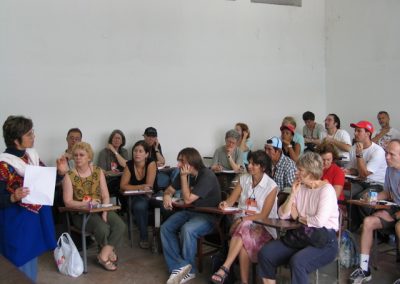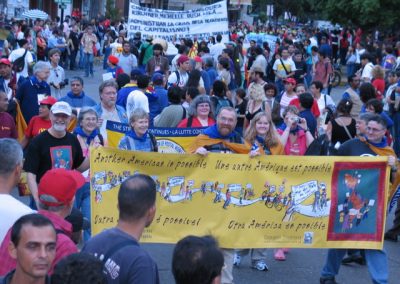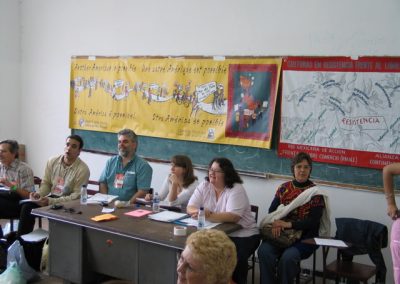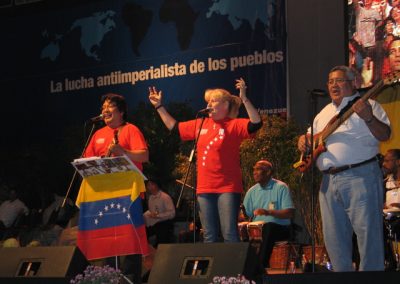Rick Arnold’s on-site reports from the World Social Forum in Caracas, Venezuela
REPORT FROM CARACAS # 2: from Rick Arnold
Jan 28, 2006
World Social Forums in the past have been characterized by huge numbers of people seeking out a multitude of interesting sessions, some of which switch location at the last moment sending those interested in a mad scramble to get to the new location asap. Things are no different in the 2006 Caracas version of the WSF in this department. Unofficial tallies put the number of WSF registered participants at between 70,000 and 100,000. There were 2200 events, workshops, panels etc. to choose from over a five day period.
The four North American networks combatting the FTAs sponsored a Jan. 25 panel on the Security and Prosperity Partnership for North America (SPP)that had some 70-80 people in attendance. Several people came from Venezuela, Brazil, Cuban medical mission, Colombia and other Southern nations. There was also a strong showing from Canada, Quebec and the USA. Each panel presentation built on the other, and the organizers accomplished both of the objectives of imparting information on the SPP as well as beginning a dialogue with those present on an action plan to stop the SPP and the potential spread of the US ‘security agenda’ to other ‘free trade’ negotiations in our hemisphere.
A major event for social movement representatives gathered in Caracas was the speech that Venezuelan President Hugo Chavez made at a packed Poliedro indoor complex. Chavez emphasized that while other attempts at reform or revolution over the past centuries had had an impact on making the Americas a better place, all in the end had failed to dislodge the Empire or put an end to the capitalist system. He emphasized that there was now a new mood for change in the Americas (and around the world) that all of us were also responsible for building on. While optimistic about challenging the dominant and predatory economic system that is impoverishing us all, he did caution that this might be the last chance we get to turn things around before the logic of capitalism leads to the destruction of humankind on this earth.
Chavez had a couple of messages for the social movements members and leadership in Caracas. He indicated that ‘as a government’ he supports the proposition that social movements must maintain autonomy from governments (likely aimed at the HSA following critique coming out of the Mar del Plata Peoples Summit). A second message for the organizing committee of the WSF was that there is a potential danger of the WSF becoming ‘folkloric’ if all that was accomplished during WSFs was the sharing of info. with no second step of working on action plans (in common) to defeat the capitalist system worldwide.
Throughout the WSF Venezuelans treated all of the delegates from other countries very warmly as if they were ‘en su casa’. We all noted that the slogan for this Caracas version of the WSF had been changed slightly to ” Otro Mundo es Necesario; y tu lo haces posible”. We leave Bolivarian Venezuela with much food for thought and with batteries recharged to face the upcoming challenges in our respective home countries.
REPORT FROM CARACAS # 1: from Rick Arnold
Jan 26, 2006
The World Social Forum-Caracas 2006 section kicked-off oficially on the afternoon of Jan 24 with a 4-plus kilometer massive and colourful march from the Venezuelan Central University to Plaza de los Proceres. The rest of the evening was dedicated to the opening event for the WSF featuring cultural acts from all over the Americas that had tens of thousands in the plaza moving to its caliente rhythms.
With a Harper minority just having been declared in Canada, it was particularly significant to be in Venezuela – one of several countries south of the Panama canal that have voted in left-of-centre governments, all of which in one way or other represent a regional distancing from Washington’s agenda for the Americas.
The Hugo Chavez government in Venezuela stands out not only as one of the fiercest critics of the Bush administration, but it is also is bucking the neo-liberal privatization formula by promoting greater state involvement in the battle against poverty. A couple of nights ago an economist on the state tv station Canal Ocho talked about the high rate of poverty inherited by the Chavez government that in the last two years has been showing some signs of being turned around. In 2004, according to this economist, the poorest segment of the population in Venezuela saw its purchasing power increase by some 32%, and this has gone up by 50% in 2005. Perhaps not a startling turn around yet as most people living in poverty here start from almost nothing, but it does go some way in explaining the continued high approval rates for the Chavez government.
Paying attention to the social needs of a long neglected majority of the Venezuelan population has to be the number one domestic challenge for the Chavez government now that it has scored some strategic victories at the ballot boxes and on the streets against a numerically small but well heeled opposition. Successful literacy campaigns and Cuban doctors in the poor barrios is an important part of the change equation, but it will be the longer term ability by barrio members themselves to organize and fight for improvements in their daily lives, that will help guarantee that these positive changes will be difficult to reverse by any succeeding government of a different political stripe.
Many of the populous barrios in and around Caracas are ‘built’ on earlier land take-overs that have never been legalized. This Bolivarian government has stated that each home owner can get individual title to her or his land, but only if they work through a larger community grouping (some 200 other owners) to petition government for land titles. A masterful strategy since in many cases these larger groupings have gone on to become a nucleus in tackling long running community problems.
This is the beginning of a broader learning experience for me and the several hundred WSF delegates from Canada that have turned up to participate in the Jan 24-30 Forum (while at the same time getting a closer look at the evolving situation in Venezuela). I hope to be able to report further on the changing panorama in Venezuela as well as events at the WSF shortly.






